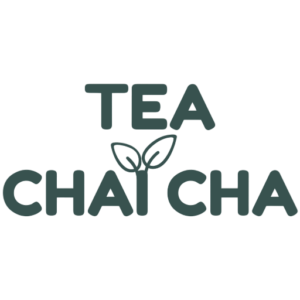Do you ever find yourself relishing a delicious boba tea, but that nagging question lingers: “How much caffeine am I actually sipping?“
I know that feeling – the desire for a perfect start to your day, without any surprises.
Well, fret not!
SHORT ANSWER!
Boba tea has 50 mg of caffeine per 8 oz. cup on average. Since it depends on the types of tea base, your boba tea can have anywhere from 20 – 90 mg caffeine per serving. There are also caffeine-free boba teas to enjoy for people with caffeine sensitivity.
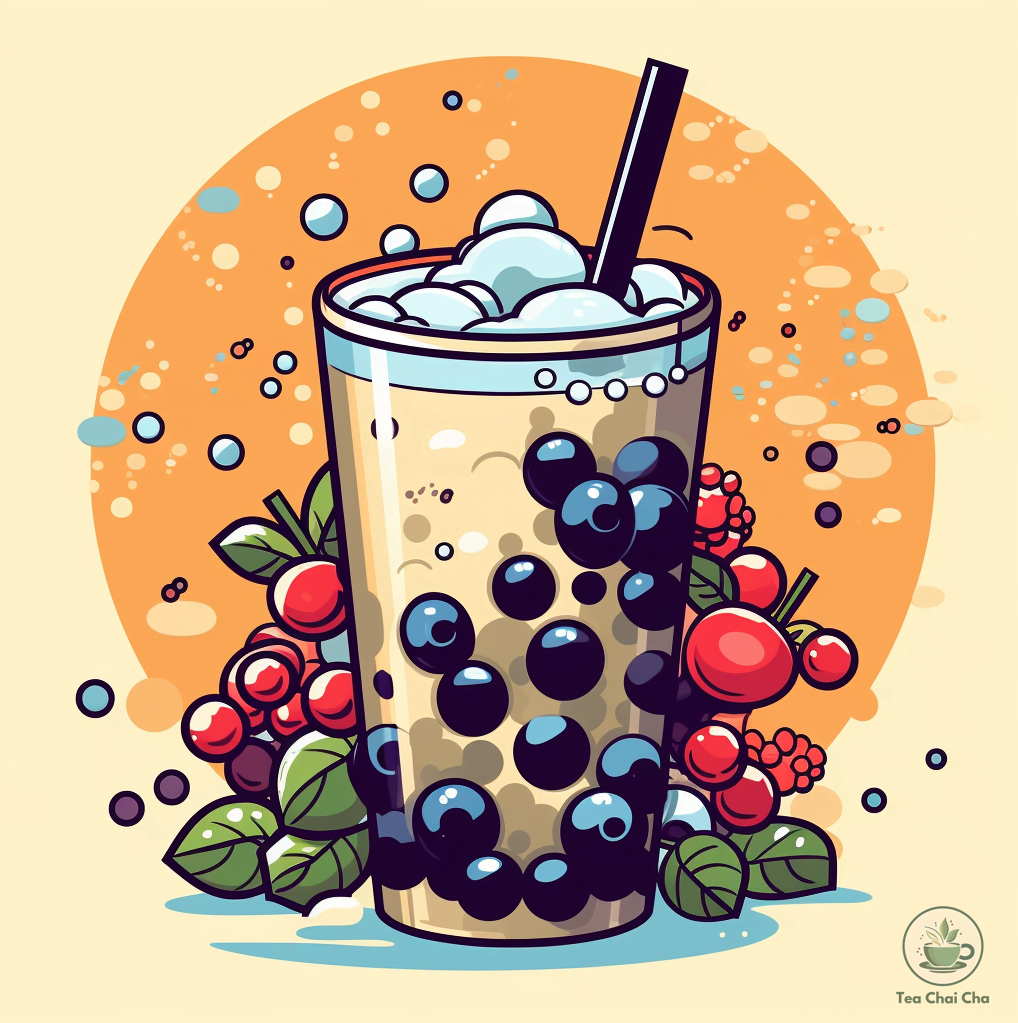
Is Boba Tea Caffeinated?
Yes, boba tea does have caffeine in it and that caffeine comes from the tea base.
However, caffeine in tea is different from the kind you find in coffee.
It’s not a fast-acting energy jolt, and it won’t give you those jittery feelings or a post-coffee crash.
When you sip on boba tea, you can enjoy it without worrying too much about caffeine crashes.
But keep in mind, if your drink has loads of sugar, you might still experience a sugar crash, so moderation is key.
On average, an 8 oz. cup of boba tea has about 50 mg of caffeine.
As I said, some boba teas can have as little as 20 mg, while others might pack a punch with up to 90 mg of caffeine in one serving.
Do Boba Pearls Have Caffeine?
Boba pearls or boba balls, those delightful little chewy balls in your bubble tea, do not contain caffeine.
Yep, you heard me right – no caffeine in those tiny spheres!
Boba pearls are made primarily from tapioca starch, which comes from the cassava root.
They’re cooked in a sweet syrup, giving them that unique flavor and chewy texture that we all love.
But caffeine? Nope, it’s not part of the boba pearl party.
So, if you’re looking for that caffeine kick, you won’t find it in your boba pearls.
The caffeine in your bubble tea comes from the tea itself, usually black or green tea.
It’s the tea infusion that gives your drink that extra pep.
How Much Caffeine Is in a Cup of Boba Tea?
When it comes to boba tea, size matters.
Most boba tea shops offer two standard sizes: regular and large.
| Tea Base | Caffeine (16 oz) | Caffeine (24 oz) |
| Black Tea | 100-160 mg | 150-240 mg |
| Green Tea | 100-120 mg | 150-180 mg |
| Oolong Tea | 100-140 mg | 150-210 mg |
| Herbal Tea | No Caffeine | No Caffeine |
| Fruit Tea | 50-80 mg | 75-120 mg |
The regular size is typically a 16-ounce drink, while the large size is a more substantial 24 ounces.
It’s all about how much boba goodness you’re craving and how big your thirst is.
As a baseline, an 8-ounce cup of boba tea usually contains about 50 to 80 milligrams of caffeine.
But since we’re talking about 16-ounce and 24-ounce sizes, let’s break it down:
Regular (16 ounces)
- Low Caffeine: If your boba tea is on the lower end of the caffeine spectrum, say 50 mg per 8 ounces, then your regular 16-ounce boba tea might have around 100 mg of caffeine.
- Medium Caffeine: For a moderate caffeine kick, at 65 mg per 8 ounces, your 16-ounce boba tea could contain around 130 mg of caffeine.
- High Caffeine: And if you’re after a real wake-up call with 80 mg of caffeine per 8 ounces, your 16-ounce boba tea may pack a punch with approximately 160 mg of caffeine.
Large (24 ounces)
- Low Caffeine: In the 24-ounce size, a low-caffeine boba tea might provide around 150 mg of caffeine.
- Medium Caffeine: A medium caffeine option at 65 mg per 8 ounces could deliver approximately 195 mg of caffeine.
- High Caffeine: For those who need an extra boost, a 24-ounce boba tea with 80 mg of caffeine per 8 ounces might contain about 240 mg of caffeine.
Does Fruit Bubble Tea Have Caffeine?
YES, fruit bubble tea has caffeine in it.
Fruit bubble tea is a delightful blend of tea and fruit syrup, just like the name suggests.
Now, you might be thinking, “Doesn’t tea have caffeine?“
You’re right, it does, but here’s the twist – fruit syrup can actually dilute the caffeine content of the tea base.
Here’s how it works: when you make traditional tea, like black Assam tea, you’re using tea leaves that naturally contain caffeine.
But in fruit bubble tea, the star of the show is the fruit syrup.
When you mix this sweet syrup with the tea, it’s like adding a splash of flavor to your caffeine.
Think of it this way: if you were to pour a cup of pure tea and a cup of fruit bubble tea side by side, the fruit bubble tea would have less caffeine.
That’s because the fruit syrup takes up some space in your cup, leaving less room for the tea.
So, while there’s still some caffeine in fruit bubble tea, it’s in a much smaller quantity compared to a regular cup of strong black tea.
That’s why it’s a great option if you’re looking for a tasty beverage with a hint of caffeine, but not an overwhelming jolt.
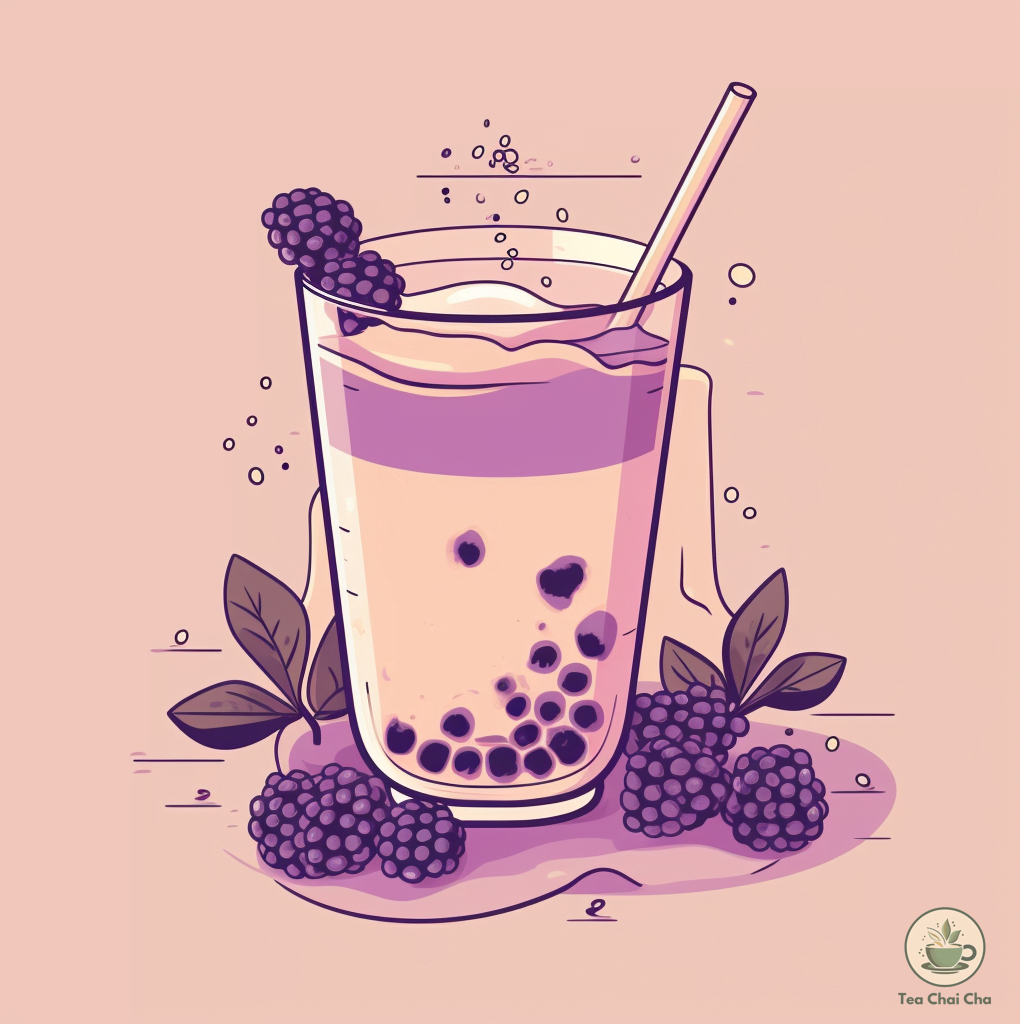
Does Taro Boba Tea Have Caffeine?
Taro boba tea may and may not have caffeine in it, it depends on how it’s made.
If you go for plain taro milk boba tea, you’re in the clear – it’s caffeine-free.
That’s because taro root itself doesn’t have any caffeine hiding in it.
So, if you’re looking for a caffeine-free sip, this option is a go!
But if you opt for a true taro milk tea that’s mixed with green tea or jasmine tea, then there’s a bit of caffeine in the mix.
Green and jasmine teas contain caffeine naturally, so your taro milk tea will have a little kick of caffeine in it.
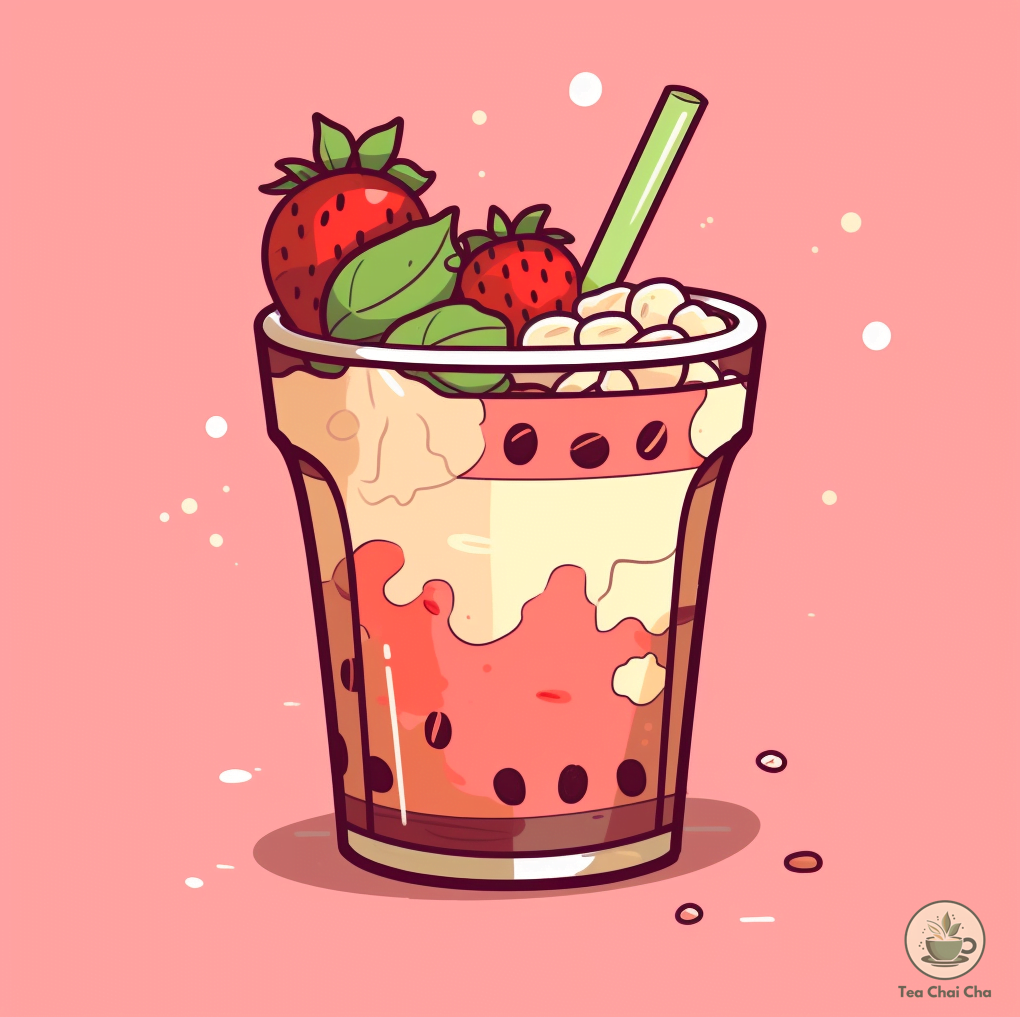
Does Strawberry Milk Tea Have Caffeine?
Strawberry milk tea typically doesn’t have caffeine unless it’s made with real tea leaves.
Let me explain why.
Strawberry milk tea is usually a blend of strawberry flavoring, milk, and sometimes sugar or sweeteners.
These ingredients, by themselves, don’t contain caffeine.
However, if the tea shop or person making it adds black, green, or oolong tea to the mix, then it could contain caffeine because those types of tea naturally have caffeine.
So, it all boils down to the base tea.
If it’s just strawberry flavoring and milk, you’re in the clear – no caffeine.
But if it includes real tea leaves, you might get a little caffeine kick from it (depending on the tea type.)
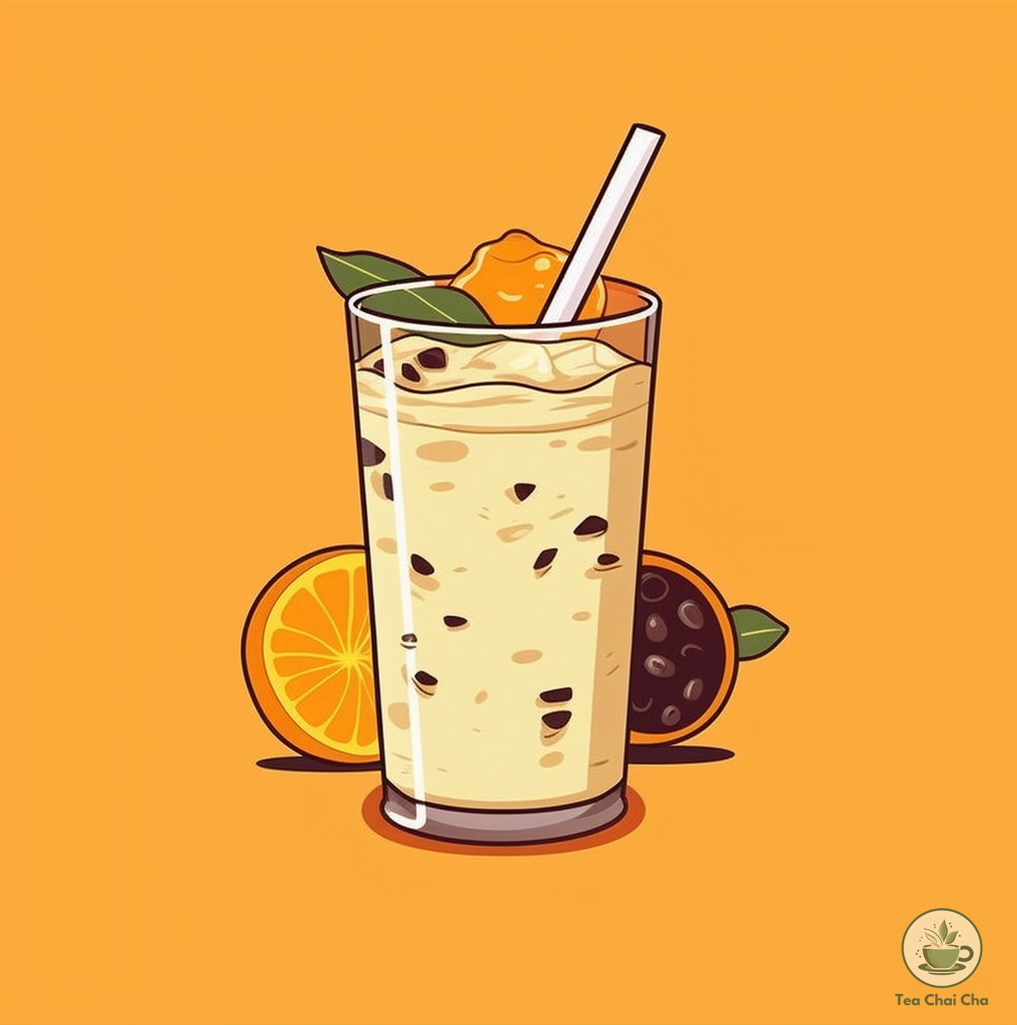
Does Mango Bubble Tea Have Caffeine?
Mango bubble tea can indeed have caffeine, and here’s why: It all boils down to the type of tea used in the recipe.
You see, some mango bubble tea recipes call for black tea, green tea, or jasmine tea as the base.
These teas naturally contain caffeine.
So, if your mango bubble tea is made with any of these tea bases, it’s likely to have caffeine in it.
The mango nectar or syrup used in the bubble tea can dilute the caffeine content a bit.
But still, you can expect to find around 30 to 40 milligrams of caffeine in an 8-ounce cup of mango bubble tea if it’s made with true teas.
Does Brown Sugar Bubble Tea Have Caffeine?
Brown Sugar Bubble Tea can have caffeine, but it depends on the type of tea base used.
The original boba drink from Taiwan doesn’t contain any tea, so it’s caffeine-free.
However, if it’s made with a black tea base, you can expect up to 200 mg of caffeine with 600 calories in a 24 oz cup.
Which Boba Tea Has the Most Caffeine
The boba tea with the most caffeine is the one made with black tea.
Why?
Because black tea is the king of caffeine when it comes to teas.
Among all the different types of teas out there, black tea reigns supreme in the caffeine department.
That’s because black tea leaves undergo a longer oxidation process, which gives them that robust flavor and, you guessed it, more caffeine.
So, if you want more caffeine in your boba tea, ask for black tea as your base. It’s that easy.
Just go black, and you’ll get the caffeine boost you’re looking for in your refreshing boba drink.
Caffeine in Boba Tea vs. Other Teas
Here’s a breakdown of the caffeine levels in an 8-ounce serving of boba tea and some familiar tea varieties.
| Tea Type | Caffeine Content |
| Boba Tea | 50-80 mg |
| Black Tea | 50-90 mg |
| Green Tea | 30-50 mg |
| Oolong Tea | 50-70 mg |
| Herbal Tea | 0 mg |
| Fruit Tea (no true tea) | 0 mg |
Caffeine in Boba Tea vs. Coffee
In one corner, we have Boba Tea, the sweet, chewy, and refreshing Asian beverage.
In the other corner, it’s the classic wake-up call, Coffee.
When it comes to caffeine, how do these two favorites stack up?
| Beverage | Caffeine Content (8 oz) | Caffeine Content (16 oz) | Caffeine Content (24 oz) |
| Boba Tea | 50-80 mg | 100-160 mg | 150-240 mg |
| Coffee | 95 mg | 190 mg | 285 mg |
- In an 8-ounce cup, coffee has approximately 1.9 times more caffeine than boba tea.
- In a 16-ounce cup, coffee has roughly 1.2 times more caffeine than boba tea.
- In a 24-ounce cup, coffee boasts about 1.9 times more caffeine than boba tea.
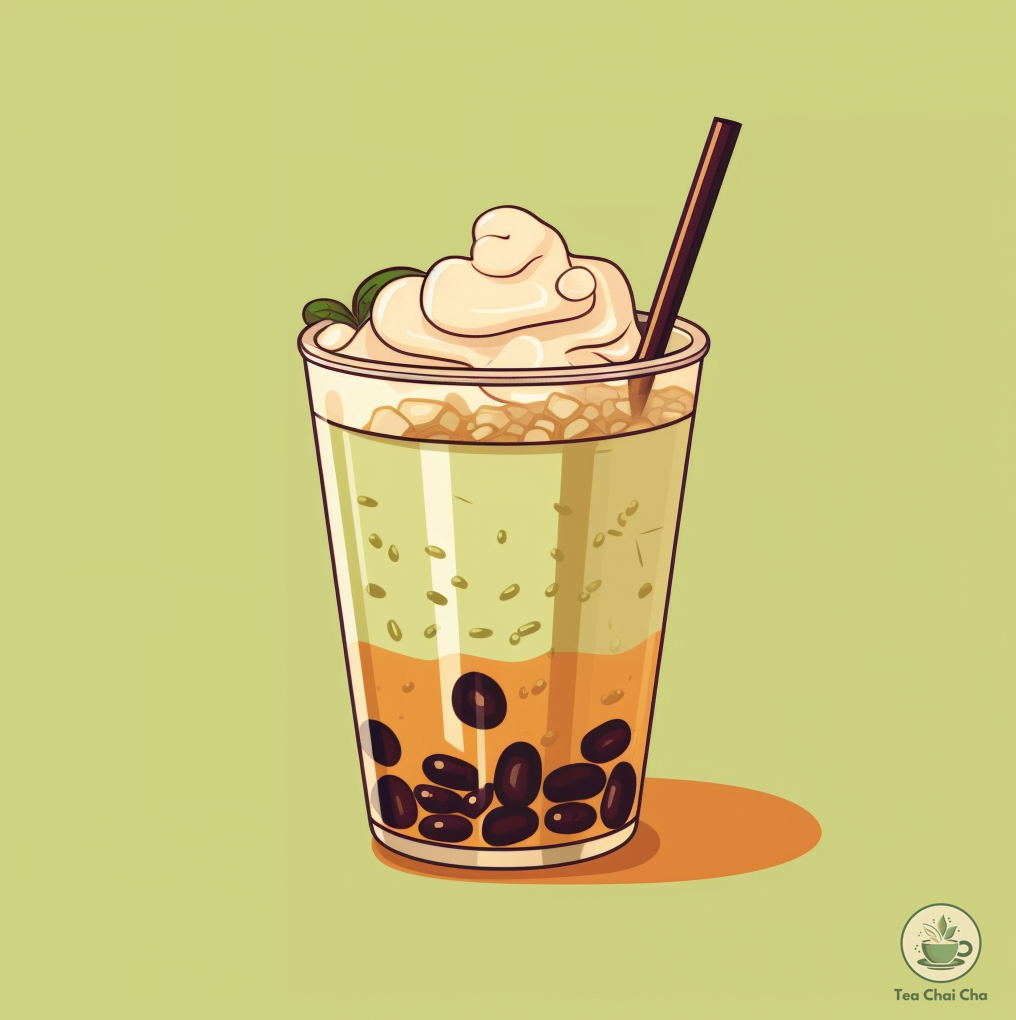
Caffeine in Decaf Boba Tea
Decaf boba tea does exist, and it can be caffeine-free as well.
Decaf boba tea is made using decaffeinated tea leaves or caffeine-free herbal teas instead of the regular tea leaves that contain caffeine.
The tapioca pearls (those chewy little bubbles in boba tea) are usually caffeine-free too.
When you sip on decaf boba tea, you won’t be getting that caffeine kick that keeps you awake.
So, whether you’re craving classic milk tea, a tropical fruit infusion, or a creamy taro boba, there’s a decaf version waiting for you.
Just ask for decaffeinated tea as the base, and you’ll be sipping on boba goodness without the caffeine.
6 Factors Affecting Caffeine Content in Boba Tea
Wondering why your favorite bubble tea sometimes packs a caffeine punch while other times it’s more mellow?
Let’s check the factors that affect the caffeine content in your delicious boba drink.
1. Tea Base Type
First things first, the type of tea used as the base makes a big difference.
Black tea is a caffeine superstar, containing more caffeine than green or oolong tea.
So, if your boba tea starts with black tea, expect a higher caffeine kick.
2. Brewing Time and Temperature
The way the tea is brewed matters.
Longer steeping times and higher temperatures can extract more caffeine from the tea leaves.
If you’re looking for a less caffeinated boba experience, ask for a shorter brew time and a lower temperature.
3. Tea Leaf Grade
High-quality tea leaves often have more caffeine.
Premium teas, like those with whole leaves or buds, tend to yield a stronger caffeine content in your boba tea.
4. Sweeteners and Syrups
Adding sugar or syrups to your boba tea might be sweet, but it won’t change the caffeine content.
These additives won’t affect the caffeine levels in your drink, but may have an impact on caffeine absorption.
5. Toppings and Fillings
The toppings you choose can also impact caffeine content.
Tapioca pearls, for example, are caffeine-free, but coffee jelly or popping boba might contain caffeine.
So, consider your toppings when calculating your boba tea’s overall caffeine load.
6. Portion Size
Finally, how much boba tea you consume matters.
Larger servings naturally have more caffeine than smaller ones.
Keep that in mind if you’re watching your caffeine intake.
10 Tips to Reduce Caffeine in Boba Tea
Reducing caffeine in your boba tea can be as simple as choosing the right ingredients and customization.
Here’s what I’d suggest:
Tip 1: Opt for Decaf Tea
Start by choosing decaffeinated tea as the base for your boba. It’s caffeine-free, ensuring a milder kick.
Tip 2: Steep It Light
When brewing your tea, don’t let it steep for too long.
A shorter steeping time means less caffeine infusion.
Tip 3: Use Herbal Tea
Swap traditional black or green tea for herbal options like chamomile or rooibos.
They’re naturally caffeine-free.
Tip 4: Half-and-Half Mix
Blend caffeinated and decaffeinated tea in your recipe.
This cuts caffeine content without sacrificing flavor.
Tip 5: Reduce Sugar
Less sugar can offset the intensity of caffeine.
Try using less syrup or sweeteners in your boba tea.
Tip 6: Smaller Tea Portion
Using less tea in your boba mixture can help reduce caffeine intake.
Tip 7: Choose a Caffeine-Free Tapioca
Look for tapioca pearls that don’t contain caffeine.
Don’t choose coffee boba pearls.
This is an easy way to lower caffeine in your boba tea.
Tip 8: Choose Whole Milk for Lower Caffeine Content
Non-dairy options like almond or oat milk may actually increase caffeine content.
This is because these milk alternatives lack fat, which can bind to caffeine molecules.
Instead, consider choosing whole milk, which has a lower fat content compared to other types of milk like 2% or skim milk.
Tip 9: Cold Brewed Tea
Consider cold brewing your tea. It typically contains less caffeine than hot-brewed versions.
Tip 10: DIY at Home
Lastly, consider making your boba tea at home. This way, you have full control over the ingredients and can easily adjust the caffeine content to your liking.
Does Boba Tea Make You Awake?
Boba tea, also known as bubble tea, contains caffeine.
Caffeine is a natural stimulant that can help increase alertness and make you feel more awake.
So, if you’re sipping on a boba tea with a good amount of caffeine, it can give you a little energy boost, just like a cup of coffee.
Now, the “no” part of the answer comes into play.
Boba tea is not a magical drink that will keep you awake for hours on end.
Its caffeine content is generally lower than that of a typical cup of coffee, so the energy boost you get may be milder and shorter-lived.
Plus, boba tea often contains sugar, which can lead to a quick spike in energy followed by a crash.
So, while it might make you feel awake initially, the sugar crash that follows could leave you feeling more tired than before.
Caffeine in Other Teas
Frequently Asked Questions (FAQs)
What is boba made of?
Boba tea is typically made from brewed tea, milk, sweeteners (like sugar or honey), and tapioca pearls (boba).
Is boba milk tea healthy?
Boba milk tea is not considered healthy due to its high sugar content and the calories from milk. It’s more of an occasional treat than a daily beverage.
Which boba has no caffeine?
Herbal boba teas like chamomile or fruit-based ones typically have no caffeine. Check the menu for caffeine-free options.
Can kids drink boba?
Yes, kids can drink boba, but it’s best to limit their consumption due to the sugar content.
Opt for smaller sizes and choose boba with less sugar if possible. When possible, make caffeine-free boba at home.
